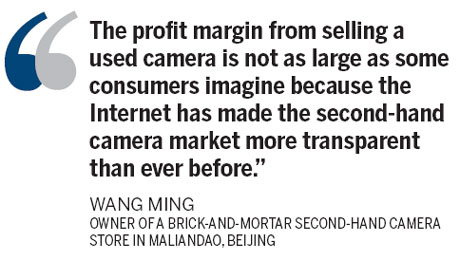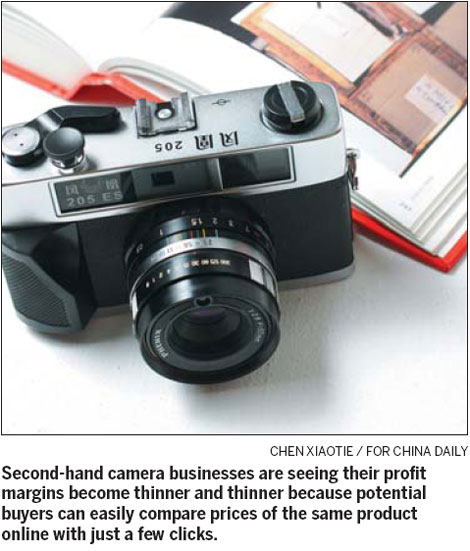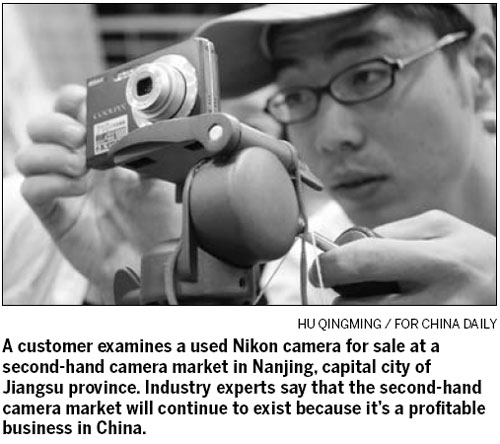Second-hand camera shops focus on Web


Back in 2007, when Wang Ming started his second-hand camera business, there were only five online shops on Fengniao.com, a website to which digital camera buyers would go for advice and information about the camera market and photography.
But now Fengniao.com has become a popular website among amateur and professional photographers. The number of daily visits to it have reached 1 million and its registered users have increased to 2 million, according to the website's statistics. With its growing prevalence among camera users, Fengniao has also become an important online trading platform for all kinds of cameras, including digital single lens reflex and film single lens reflex - devices that show precisely what will appear in the resultant image.
"The number of deals made is about seven to eight in my shop every day and, in the past five years, the value of total trade volume reached more than 10 million yuan ($1.6 million) with a majority of revenue coming from our online store on Taobao.com," said Wang Ming, who runs a brick-and-mortar second-hand camera store in Maliandao photographic equipment shopping market, one of Beijing's largest trade centers for photographic apparatus.
About 80 percent of the cameras in Wang's store - Jindian Camera - come from individual camera owners across the country, who send their used cameras to Wang's shop via express delivery and then get paid through online payment platforms. The rest 20 percent come from other business or media organizations.
The value of stock in Wang's Jindian Camera is more than 1 million yuan, he said.
Usually, the price gap between a brand new camera and a used one is up to 1,000 yuan if the product model is in demand in the market, Wang said.
However, the price of a second-hand camera is adjusted according to the market situation. For example, when an updated version of a camera model enters the market, the price of the old version's second-hand products will be lowered.
"Sometimes, price cuts happen seven or eight times in my store," Wang said.
It is not an easy job setting the price of used cameras.
Zheng Liping, owner of another second-hand camera shop, Beyond Camera, has decided to start selling new products instead in a month.
"I made the decision because it's burdensome for me to assess the value of used cameras, which can only be done by me in my store," Zheng said.
The complexity of second-hand cameras requires the workers who are responsible for setting prices to have comprehensive skills, from knowing common machine faults to having good communication skills with customers. It is an ability that can only be gained through years of working in the field, he said.
The potential for business development is also part of the reason he made the strategy shift because the second-hand camera market has gradually become saturated.
Beijing-based Wukesong photographic equipment market has been operating for nearly 15 years. It originally developed from second-hand apparatus sales.
Currently most shops in it sell new products, with just a few stores selling second-hand items, said Zheng, whose Beyond Camera is located in the market.
"The profit margin from selling a used camera is not as large as some consumers imagine because the Internet has made the second-hand camera market more transparent than ever before," said Wang.
Potential used-camera customers can easily find the information they need online and compare the prices of the same product with just a few clicks.
Liu Keli, a high school student from Shanwei, in South China's Guangdong province, bought his second-hand Fuji S205 digital camera in 2011 for 2,000 yuan, 500 yuan cheaper than the new one.
"I found the seller online and made the payment through Taobao.com, a deal with which I'm quite satisfied," Liu said.
Xiang Yang, who majored in photography at university and who now works as a professional portrait photographer, prefers to search for camera-related information on popular second-hand goods trading platforms, for example the website 58.com, instead of some transaction platforms which only involve photographic equipment, such as Fengniao.com.
"The cost and performance of second-hand cameras, details of which are available on popular goods sales platform, are better than that on fengniao.com because amateur photographers use the cameras much less frequently than professionals and they tend to go to those popular goods transaction platforms to find potential buyers," Xiang said.
Recently, Xiang bought a used Canon 5D II kit for 15,000 yuan from a man he met in a QQ group and paid for the digital single lens reflex camera through the online payment company Alipay.com Co. The brand-new licensed kit normally sells for about 19,000 yuan.
Both novices and veterans buy used cameras. Novices tend to learn the basics with decent used devices before they spend more on a new product. Veterans know exactly what they are buying and which second-hand camera is a good deal.
Liu bought his second-hand Fuji S205 when he was just starting to learn photography. Xiang said the used Canon 5D II kit he purchased is "quite cost-effective because the machine is 95 percent new, having a shutter count of 8,000, and it has not been used much".
"I think in the future, the second-hand camera market will continue to exist because it's a profitable business, but there won't be colossal profits because the online platforms have made the market situation more and more transparent," said Wang.

(China Daily 07/16/2012 page13)














